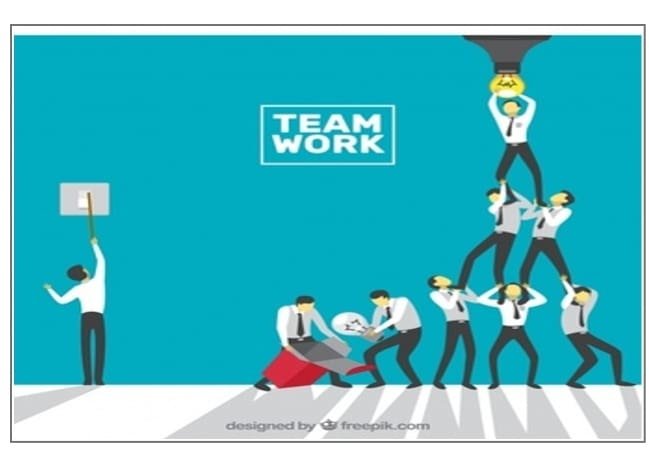Every person have their own way of doing things, some prefer doing it all alone as an INDIVIDUAL whereas others prefer to work with others – TEAMWORK. Every coin has two faces similarly they both have their own heart and soul. But, the way of completion of work depends on the individual and the nature of task.
An individual work is the work which has to be done by a specific person to complete critical tasks which requires specialised knowledge and skill in that particular area of work. Working individually leads to immediate completion of task which is less time consuming than the work done by a team. Coding, designing, painting, crafting etc. is done by individuals having specified knowledge and skills in that domain. Programmers, designers, artists do work individually as these requires high concentration and focus. Also, when an individual is working alone he/she has complete freedom to do tasks as per his/her will, there is no one to take consent from. An individual is very efficient while working. In an individual work a person has to take all the decisions by himself, thus he is solely responsible for the accomplishment of tasks. There is no conflicts regarding any subject matter as no one can interrupt in between, an individual does the work according to his comfort. Self motivation is the key to work individually. Person who is working alone he himself is the only source of motivation for himself/herself. When a person is completely engaged into an activity he/she is in flow to achieve something and this flow will help to accomplish the work. Other way out is that when an individual has to acquire a new skill or to learn something in order to improvise themselves then they have to work individually. Discipline and Never giving up will along with positive attitude is the key to successful accomplishment of task. While working individually a person is most efficient for a task, thus every course of action has to be taken after its critical analysis as the person is solely accountable for the outcomes be it positive or negative.
‘”ALONE WE CAN DO SO LITTLE BUT TOGETHER WE CAN DO SO MUCH”
HELLER KELLER
Teamwork is to work together to create or to achieve something which is common for every individual team member. It is to work towards a common objective in an efficient and effective manner. A team leader must ensure that all the available resources have to be utilized constructively in order to ensure its best productivity. Teamwork is present in almost every aspect of our life whether its personal or professional.
A story named ‘The Old Man and His Sons’ from our childhood depicts an extravagant learning of ‘UNITY IS STRENGTH’. In which an old man sees his sons quarrelling, when he was near his death he wanted to make them learn the lesson of unity, for the same purpose he calls them with a bundle of sticks, untie it and ask them to break it one by one, they were able to break it but when those sticks were together tied in a bundle they weren’t able to break. By doing so the old man was able to teach them that though each can be overcome alone, they are invincible combined. Thus, an effective team must have shared purposes, mutual understanding and self-corrective behaviour. Every team member should be given opportunity to express their notions and opinions, also they must be appreciated for their contribution towards the outcome. Teamwork has always been an essential part of successful organisations in an ‘Innovate or Die Economy’ where there is disruption due to Digitisation. Teams in future will work on 4-D : Diverse, Dispersed, Digital, Dynamic but the fundamental skills of an effective team will be same i.e. effective communication, delegation, efficiency, ideas and support. The basics of team effectiveness were identified by J. Richard Hackman, a pioneer in the field of organizational behaviour who began studying teams in the 1970s. In more than 40 years of research, he uncovered a ground breaking insight: What matters most to collaboration is not the personalities, attitudes, or behavioural styles of team members. Instead, what teams need to thrive are certain “enabling conditions.” Enabling Conditions are a compelling direction, a strong structure, and a supportive context. Every outcome of group depends upon its direction and for a 4 D team which has members from dissimilar background direction plays a very significant role thus a team leader must ensure that direction energizes, orients and engages all its members to work for a common goal. People from dissimilar background interpret common goal differently hence it is necessary to have balanced skills in a team. Having the right support is the third condition for team effectiveness. Encouraging team members rewarding them for their efforts towards the common goal this will help the leader to take off initially from a lot of problems.
And hence an Individual commitment to a team effort is what makes a team work, a company work, a society work, a civilization work.

Ms. Priyanka Deshmukh – Management Trainee- TVC
Shivalik Institute of Management Education and Research, Balod Road, Durg, Chhattisgarh

